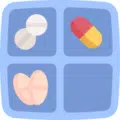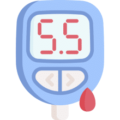Case Author
Katherine A. Owens, PharmD
Allison Zuern, PharmD, BCACP
Expert Guests
Jennifer N. Clements, PharmD, BCPS, BCACP, BC-ADM, CDCES
Stefanie Nigro, PharmD, BCACP, CDCES
 Katerine Owens PGY2 Am Care Resident Lifespan Rhode Island Hospital Providence, RI |  Allison Zuern Clinical Pharmacy Specialist Lifespan Rhode Island Hospital Providence, RI |  Jennifer Clements Clinical Professor University of South Carolina College of Pharmacy |  Stephanie Nigro Associate Professor University of Connecticut School of Pharmacy |
The Case!
Setting
A family medicine primary care office in an urban area of Rhode Island. Many patients in this practice come from diverse backgrounds and face many social determinants of health.
Patient Demographics
JR is a 68-year-old Caucasian female
✦Unless otherwise noted, the patient’s sex assigned at birth and current gender identity are congruent.
Reason for Visit
J.R was recommended to see a medical professional by her community pharmacist after frequently reported low blood glucose readings. This is her first visit to this family medicine office — her previous PCP retired over a year ago.
History of Present Illness and Presenting Symptoms
Chief Complaint: “My blood sugars keep dipping really low and the swelling in my leg is unbearable”
J.R. is a 65-year-old female patient with a history of multiple chronic diseases. She presents to her primary care appointment expressing concern about her blood sugar readings. When she was picking up her insulin prescription at her local pharmacy a few days ago, the pharmacist expressed concern about the patient’s frequent low blood sugar readings. She usually experiences low blood sugars around dinner time. She states she does not feel excessively hungry or thirsty nor experiences frequent urination.
J.R. was diagnosed with T2DM about 10 years ago during a routine screening. She was surprised because she was asymptomatic. Since her diagnosis, the only change that has been made to her treatment regimen is the number of insulin units and formulation.
J.R. reports that she has committed to a healthier lifestyle. She has significantly reduced the amount of processed carbohydrates she eats and decreased snacking. For breakfast, lunch, and dinner, she has been trying to add more fruits, vegetables, grains, and healthy fats. She admits that she still eats take-out or fast food about 3 times weekly (previously 7 times weekly), which she calls her “cheat meals.” They usually consist of Chinese food or burgers and fries. Since January 1st, she states she has lost 5 pounds. She also reports that she has been walking her dog, Blue, for at least an hour a day. Her goal is to get more steps in daily. She usually walks with her next-door neighbor.
JR measures her blood glucose at home with her Walmart brand testing kit. She measures about twice daily. She brought her BG log to the clinic for review.
Self-reported blood glucose log
| Date | ~8am (fasting) | 30 mins prior to dinner |
| T-5 | 112 | 54 |
| T-4 | 86 | 70 |
| T-3 | 87 | 134 |
| T-2 | 103 | 156 |
| T-1 | 75 | 61 |
| Today | 107 |
She also reports left calf is painful, red, and warm. Swelling in her legs is “more than normal.” The primary care provider ordered a Doppler ultrasound of her lower extremities and asked the pharmacist to perform a medication review. While waiting for the provider to look at the ultrasound results, J.R. asks you to look at all her medications “for her heart.” She is worried her medication list got mixed up after her previous PCP retired. She is worried her legs are feeling more swollen but she does not want to start any medications that would be costly.
Past Medical History
- Type 2 Diabetes
- Acute pancreatitis (2019)
- Osteoporosis
- Vitamin D deficiency
- Anxiety
- HFrEF (LVEF = 38%)
Social History and Insurance
J.R is currently insured through Medicare and has a supplemental plan. She has recently been facing financial hardship and has difficulty affording copays following her husband’s recent death. She reports taking all her medications. JR has minimal support at home — she lives in an apartment on her own. She has 2 sons who live far away, so she sees them very infrequently.
- Cultural/Ethnic Background: Caucasian
- Language Spoken: English
- Religious Practices: Catholic
- Education: General Education, Bachelor of Science degree
- Occupation: Retired elementary school teacher
- Marital Status: Recently widowed 6 months ago
- Smoking Status: 10 pack per year history, quit 30 years ago
- Smokeless Tobacco: No, never
- Vaping Use: No, never
- Alcohol Use: Yes – drinks 1-2 glasses of wine weekly
- Recreational Drug Use: No, never
- Health Insurance Coverage: Medicare with supplemental, high deductible plan
Family history
- Unknown
Current Medications
- Alprazolam 0.5mg tablet as needed (reports taking about 1 / week)
- Atorvastatin 20mg tablet once daily
- Ergocalciferol 50,000 unit capsules once daily
- Escitalopram 20mg tablet once daily
- Furosemide 20mg tablet once daily
- Glipizide IR 5mg tablet twice daily
- Insulin glargine 20 units SQ at bedtime
- Insulin lispro 5 units SQ prior to each meal
- Lisinopril 10mg tablet once daily
- Metoprolol 100mg tablet twice daily
- Pantoprazole 40mg tablet twice daily
- Spironolactone 25mg tablet once daily
Physical Exam Findings / Vital Signs (TODAY)
- HEENT: PERRLA, (-) JVD.
- Respiratory: clear to auscultation
- Cardiovascular: RRR
- Abdominal: (+) bowel sounds, NTND
- Dermatologic: (-) rashes or plaques
- Extremities: (+) swelling and redness in left calf; (+) +1 pitting edema on both calves
- Neurologic: DTRs 2+ bilaterally
- Genitourinary: deferred
Review of systems
- Constitutional: endorses intentional weight loss; denies fever and chills.
- HEENT: denies changes in vision or hearing.
- Respiratory: denies shortness of breath, cough, or wheezing.
- CV: denies chest pain or palpitations
- GI: denies abdominal pain, nausea, vomiting, or diarrhea.
- GU: denies dysuria, polyuria, or painful urination.
- Metabolic/endo: denies excessive thirst or hunger, reports frequent low blood sugars
- Neuro: denies numbness, weakness, or headaches.
- Psych: denies depression; endorses minimal feelings of anxiety.
- Int: denies rash or pruritus.
- Musculoskeletal: endorses pain and swelling in left calf
- Hem: denies bleeding or bruising
| Weight | 96 kg (216 lb) |
| Height | 162.5 cm (64″) |
| BMI | 37.1 kg/m2 |
| Blood Pressure | 118/80 mmHg |
| Temperature | 98.4 °F |
| Pulse Rate | 84 bpm |
| Pain Rating | 4/10 |
Pertinent Laboratory Findings
| Component | Reference Range & Units | Today |
| Glucose | 67 – 99 mg/dL | 108 (High) |
| Sodium | 135 -145 mEq/L | 136 |
| Potassium | 3.6 – 5.1 mEq/L | 4.1 |
| Calcium | 8.5 – 10.5 mEq/L | 9.7 |
| Albumin | 3.5 – 5.0 g/dL | 4.8 |
| AST | 10 – 42 IU/L | 58 (High) |
| ALT | 6 – 45 IU/L | 74 (High) |
| Creatinine | 0.44 – 1.03 mg/dL | 0.7 |
| eGFR | Abnormal <60 ml/min/1.73M | > 60 |
| Component | Reference Range & Units | Today |
| Hemoglobin, A1c | 4.3 – 5.7% | 7.9 (High) |
Imagining
Doppler ultrasound conducted in clinic demonstrated evidence of deep vein thrombosis in the left posterior tibial vein.
FINAL NOTE: This program will be available for recertification credit through the American Pharmacists Association (APhA) Board Prep and Recertification Program. To learn more, visit the APhA Board Prep and Recertification website and sign up for the Evidence-Based Practice Series.
References and Resources
- Standards of Care in Diabetes—2023 Abridged for Primary Care Providers. Clin Diabetes. 2022;41(1):4–31
- Stevens SM, Woller SC, Kreuziger LB, Bounameaux H, Doerschug K, Geersing GJ, et al. Antithrombotic Therapy for VTE Disease Second Update of the CHEST Guideline and Expert Panel Report. CHEST Journal. 2023;160(6):E545-E608.
- Heidenreich PA, Bozkurt B, Aguilar D, Allen LA, Byun JJ, Colvin MM, et al. 2022 AHA/ACC/HFSA Guideline for the Management of Heart Failure: A Report of the American College of Cardiology/American Heart Association Joint Committee on Clinical Practice Guidelines. CHEST Journal. 2022;145:e895–e1032






 iForumRx.org is a web-based community of practice designed to inform ambulatory care pharmacy specialists, pharmacy residents, and student pharmacists about high-quality, practice-changing evidence.
iForumRx.org is a web-based community of practice designed to inform ambulatory care pharmacy specialists, pharmacy residents, and student pharmacists about high-quality, practice-changing evidence.
Very interesting case and great discussion on the podcast!